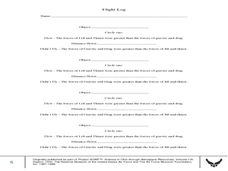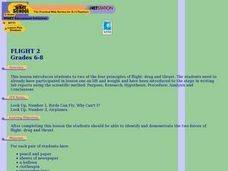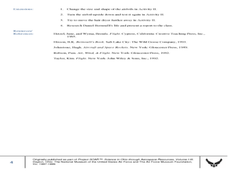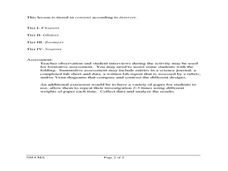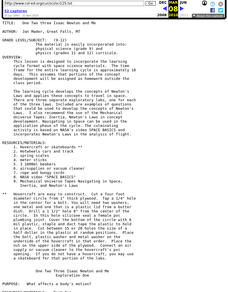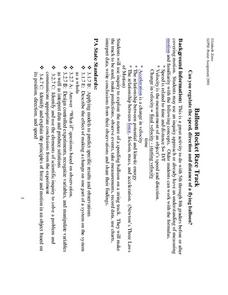Curated OER
Graphing the Four Forces
Using the Cartesian coordinate system, future flight experts plot points to determine whether or not an airplane will fly. With the four forces of weight, lift, drag, and thrust represented in different quadrants, your physics learners...
Curated OER
Wright Again: 100 Years of Flight
Aspiring aeronautical engineers demonstrate different forces as they construct and test paper airplanes. This lesson plan links you to a website that models the most effective paper airplane design, an animation describing the forces...
Curated OER
Flight
Students are introduced to the four forces of flight--drag, lift, thrust, and weight--through a variety of fun-filled flight experiments. They "fly" for short periods and evaluate factors that might either increase or decrease their...
Curated OER
Four Forces of Flight
Students explore the four forces of flight. They investigate the four forces of flight: lift, drag, thrust and weight (gravity). They experiment with flight-testing various objects commonly found around the house and constructing paper...
Curated OER
Principles of Flight: Flying Paper Airplanes
Students investigate ways to enhance an object's flying ability. In this model construction instructional activity, students construct two paper airplanes, one of which is twice as big as the first. Students compare and...
Curated OER
Household Things that Fly and Why!!!
Students examine the four forces of flight. In this flight lesson, students test to see which types of items will fly. Students make predictions on whether the item will fly or not. Students gain knowledge about lift, gravity, thrust and...
Teach Engineering
Adapatations for Bird Flight - Inspiration for Aeronautical Engineering
It's a bird, it's a ... device made to mimic birds. The eighth installment of a nine-part module has pupils read various articles to learn about bird flight. They consider the implications for aeronautical engineering.
Curated OER
Flight 2
Young scholars are introduced to two of the four principles of flight: drag and thrust. As the class watches a video on these principles, they utilize ballons, straws and clothepins to simulate what they're seeing in the show. Nice,...
Curated OER
How Things Fly
Students will examine the physics of flight through using experimental inquiry. In this lesson, you'll introduce your students to the four forces of flight--drag, lift, thrust, and weight--through a variety of fun-filled flight...
Curated OER
An Uplifting Experience
Fifth graders conduct flight experiments. In this uplifting experience instructional activity, 5th graders build an airfoil and place in a variety of conditions to observe the results of lift and force in flight, as well as angle...
Curated OER
How Airplanes Fly?
Fifth graders explore drag, thrust, lift and weight. In this airplane lesson, 5th graders define the forces that effect airplanes and design a model airplane. Students compare their models for the...
Curated OER
Origami Flight: The Physical Setting
Sixth graders investigate the forces that move certain objects. In this physics lesson, 6th graders design and create paper flying objects using origami methods, which they practice flying in different conditions. Students...
Curated OER
The Magic School Bus Taking Flight
Young scholars learn along with Ms. Frizzle's class. In this Magic School Bus lesson plan, students see how gliders coast by exploring the way different paper objects fall to the ground.
Curated OER
THE FLIGHT PLATFORM
Students examine forces that effect flight. In this flight lesson students answer questions that are asked of them and the ones that they ask themselves.
Curated OER
The Effects on Flight Characteristics/Performance Due To Variations in Design of Sled Kites.
Learners expand upon previous lessons with sled kites by varying the dimensions or materials while building a news sled kite while working in a team. They fly their original kites and the new ones under similar conditions to determine...
Curated OER
Airplanes
Fourth graders experiment with gravity and lift by building paper airplanes. In this physics lesson, 4th graders compare the falling rate of a crumpled vs. flat sheet of paper. Then after class discussion and demonstration of Bernoulli's...
Curated OER
One, Two, Three--Isaac Newton and Me
Students experiment to develop understanding of Newton's Laws and how they apply to space travel in this ten day instructional activity sequence.
Curated OER
An Uplifting Experience
Fifth graders research and complete a graphic organizer about the principles of flight. In this aviation lesson, 5th graders experiment to understand the work of Daniel Bernouli and his discoveries about air pressure. Students create...
Curated OER
UFOs
Students, in groups, construct a catapult. Then they conduct a series of experiments by catapulting a marshmallow, using different lengths of spoons, across the room. They predict, measure, and record the measured distance on a worksheet.
Curated OER
Balloon Rocket Race Track
Students discuss "How can we measure (or make it easier to record) the speed, distance or acceleration of the balloon?" They told that they are going to make a balloon racetrack. Pupils use meter sticks to accurately measure length and...
Curated OER
What Makes Thing Fly?
Second graders study lift, drag and thrust from a real flight instructor. In this physical science activity students build and fly paper airplanes and experiment with variations and design.
Curated OER
Look Mom, No Wings!
Students explain how drag, weight, lift and thrust work together to make something fly. In this physics lesson, students measure their jump height and record data on the table. They reason out why they can't remain airborne for long.
Curated OER
Aerodynamics
Students discover the basic principles of aerodynamics, including the roles and identity of natural forces involved. They examine how the force of gravity is overcome by the curved shape of an airplane wing and air pressure.
Curated OER
The Law of Inertia
Students practice the 4 question strategy to form more questions and develop further experiments. The four questions are engage, explore, explain, and elaborate. They use the 4 question strategy on an investigation involving the mass...





